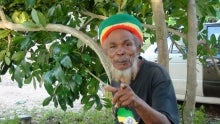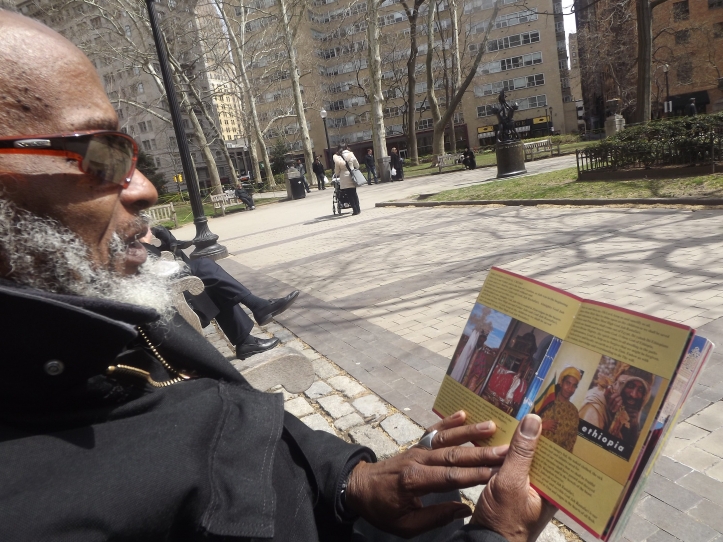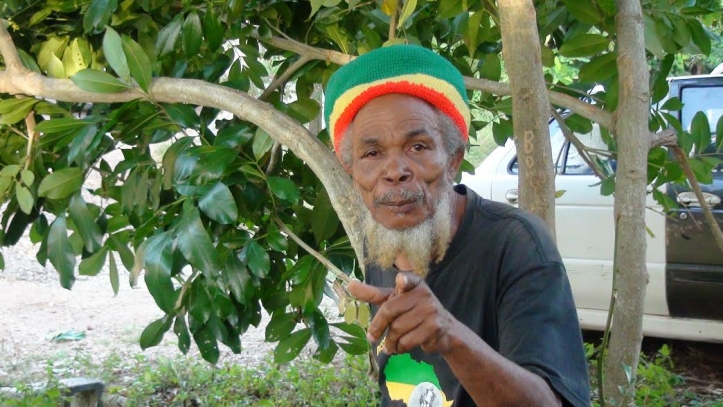I, Ethnographer (Part 2): Ethnographic Roadmaps and Navigating Vibes

"I, Ethnographer (Part 1): A Reflection on Being (in) the Field," was published in April, 2015.
One afternoon in Kingston, Jamaica, during my first fieldwork experience, Bongo Shephan Fraser (my guide, the cover photo) and I stopped at an ital restaurant owned by Priest Dermot Fagan. This was my opportunity to meet the priest, explain my research topic, and arrange a time to interview him at his school in the Blue Mountains. As we sat outside of the restaurant with a few of Fagan’s bredren, I explained that I was a reggae musician, and I wanted to understand how Rastafarians feel when white people perform this music that came out of the black liberation struggle. Shephan began to respond, and his voice suddenly shifted into an impassioned tone as he insisted that Rastafari condemns racism. This caught me off guard, and I wondered if I had unintentionally implied that their ideology was racist, so I quickly apologized for any miscommunication and attempted to explain the context of my research in clearer terms. At this point, everyone started to laugh, and one of them walked over to me to reassure me that I had not upset anyone, but this was just the way the Rastafari reason with each other: “Rasta is a people of fire, so we speak with fire.”
I often witnessed people speaking in this register, and I am still not sure if I should characterize the tones of voice as anger, excitement, or something else altogether. The fact that the concurrent topics of discussion were religious or political in nature may indicate that an aggressive form of word-sound power (according to Rastafari, this is the energy conveyed through speech acts, similar to the nommo concept of Dogon tradition) is more likely to be employed in contexts of reasoning when central tenets of the faith are called into question. I wonder how many times I have mistaken heightened tones of speech, facial expressions, and hand motions for anger or personal attacks, rather than an excited participation in a powerful exchange of ideas. Near the end of my visit, Shephan told me that some people thought I looked “lost” when I first visited the tabernacle but more comfortable on my last visit. I gave him a very simple explanation for this: I could barely understand what was being said by the people around me with their thick accents and patois, but I started to be able to follow along after a few days. In addition to the common problems in understanding different English dialects and accents, the cultural influences on tone and body language present serious challenges for any analysis of discourse.

Timi Tanzania is a Philadelphia reggae musician and art teacher. His enthusiasm for his Rastafari faith extends well beyond his musical endeavors; as shown here, Timi enjoys reading about his African roots and the history of the Rastafari movement.
The other side of this issue involves how I, as an ethnographer, am being understood – the vibe I am giving through my questions. Regardless of whether my accent or choice of words is decipherable in any given setting, the content of my questions can evoke or provoke a wide range of feelings, thoughtful responses, lively discussion, or confusion, all of which may be influenced by my relationship to the group and how I have framed my line of questioning. Despite the short time frame of my research in Jamaica, I was fortunate to have Shephan introducing me to people as a friend, saving me the trouble of earning their trust. In some cases, I had to demonstrate deeper knowledge of Rastafari, usually a teaching of Garvey or Selassie, in order to be taken seriously. I learned the hard way, however, that the possibility of being misunderstood is an inevitable part of the ethnographic process and, perhaps, a very valuable one. My interview with the late High Priest George Ions continues to teach me this lesson.
I had met the priest and some other elders outside of his home just before the Sabbath service one week earlier, and I had taken that opportunity to explain that I was researching Rastafarian perspectives on the participation of white people in reggae. The elders responded to my summary by stressing three points: reggae is only a small part of Rastafari culture; Rastafari is for everyone, regardless of color, race, or creed; and they were among those who taught Bob Marley about the Rasta faith. Sensing that the elders were uninterested in discussing the topic any further, I shared some of my own experiences with what seemed to be resentment from black Rastafarians and reggae fans in the Philadelphia area. I said that I could understand where this might come from: Marcus Garvey wrote about the importance of black people developing their own industries independent of white influence or support, yet white people who had never gone through the black liberation struggle in Jamaica were capitalizing on this cultural tradition that grew out of the Rastafari movement. Some nods and further discussion from the elders indicated that they were glad to hear of my familiarity with Garvey’s teachings and the historical context of reggae music. The service began shortly after this discussion, and I did not record any interviews that day, as I had wanted to observe and be mentally and spiritually present for the experience.
When we returned to his home on the following Sabbath, George was lying down on his couch, resting a recently broken foot. He did not seem particularly eager to be interviewed, so after he and Shephan discussed some administrative concerns, I set up my camera and promised to be brief. This was, by far, the most awkward conversation I had during my entire trip to Jamaica. Most of the priest’s answers were brief, and there were times when I may have been trying too hard to get him to elaborate on his thoughts, or I may have been asking questions that he had no interest in discussing. Eventually, the priest seemed to be getting tired of this line of reasoning.
Bean: There are songs that come to mind about slavery. Bob Marley sang about it, Gregory Isaacs sang about it. Would you be skeptical at all if I started singing those songs right now, and say maybe that’s not an honest thing, that I can’t really feel that because I didn’t go through that myself?
George: Well, really, that question is very tedious for I, yes, to tell you if you could go through it or not. You within yourself would have to know if you can go through it. For many can go through it, as plenty can go through. No, I wouldn’t have it, for as I told you, “A remnant from every nation [must praise His Majesty].” So where there the words is, one can go through the works, for the words are free to each and every man.
With only one week of formal experience in ethnographic research, I felt discouraged and unsure of myself at this point. I was already having difficulty finding people to interview; talking to a stranger about faith is not something many people are comfortable with, especially not when they have to sign a three-page consent form to do so. Adding to this, one of the most respected Rastafari elders thought of my interview questions as “tedious.”
Bauman and Briggs note the power dynamics at work in the dialogic processes of analyzing performances and texts. “To be sure,” they write, “the exercise of such power need not be entirely one-sided; our interlocutors may attempt to control how their discourse will be entextualized and recontextualized. These processes have significant implications for the methods, goals, and not least, ethics, of our profession” (Bauman and Briggs 1990:78). More recently, in his proposal for “an anthropology of interviewing,” Briggs suggests ways for ethnographers to more thoughtfully and ethically approach our research. One of his suggestions is helpful for the type of situation detailed above: “Attend to ways in which interviewees and people who refuse to participate attempt to subvert the communicable cartographies and pragmatic constraints that researchers use in attempting to structure interviews” (Briggs 2007:566).
Priest George’s response was one of several forms of subversion performed in response to my “cartography” - that is, my positioning of various values, symbols, and ideas, including my self-positioning as musician, student, white, American, and Other. Through a series of succinct speech acts, he redistributed the power within our reasoning: my construction of a perceived authenticity contingent upon race and heritage was delegitimized, not because George denied the existence of such a perspective within the movement, but because his priority was to proclaim the importance of praising Selassie. In retrospect, I think of his short answers and challenges, such as “Why not?” and “That question is very tedious,” as the beginning of my own “fieldwork enlightenment,” to borrow a phrase from Barre Toelken. Toelken challenges all ethnographers to reconsider the way we navigate our work: “We already have plenty of ‘things’ to study; what we lack is a concerted effort to understand fieldwork itself as an interhuman dynamic event with its own meanings and contextual peculiarities” (1995:35).

Bongo Shephan Fraser, the author's guide and key consultant among the Rastafari community in Jamaica. His impassioned style of speaking and gesticulating inspired the author to think more critically about the "vibe" of Rastafari speech and musical expression.
References
Bauman, Richard and Charles L. Briggs. 1990. “Poetics and Performance as Critical Perspectives on Language and Social Life.” Annual Review of Anthropology 19:59-88.
Briggs, Charles L. 2007. “Anthropology, Interviewing, and Communicability in Contemporary Society.” Current Anthropology 48:551-580.
Toelken, Barre. 1995. "Fieldwork Enlightenment." Parabola 20:28-35.





